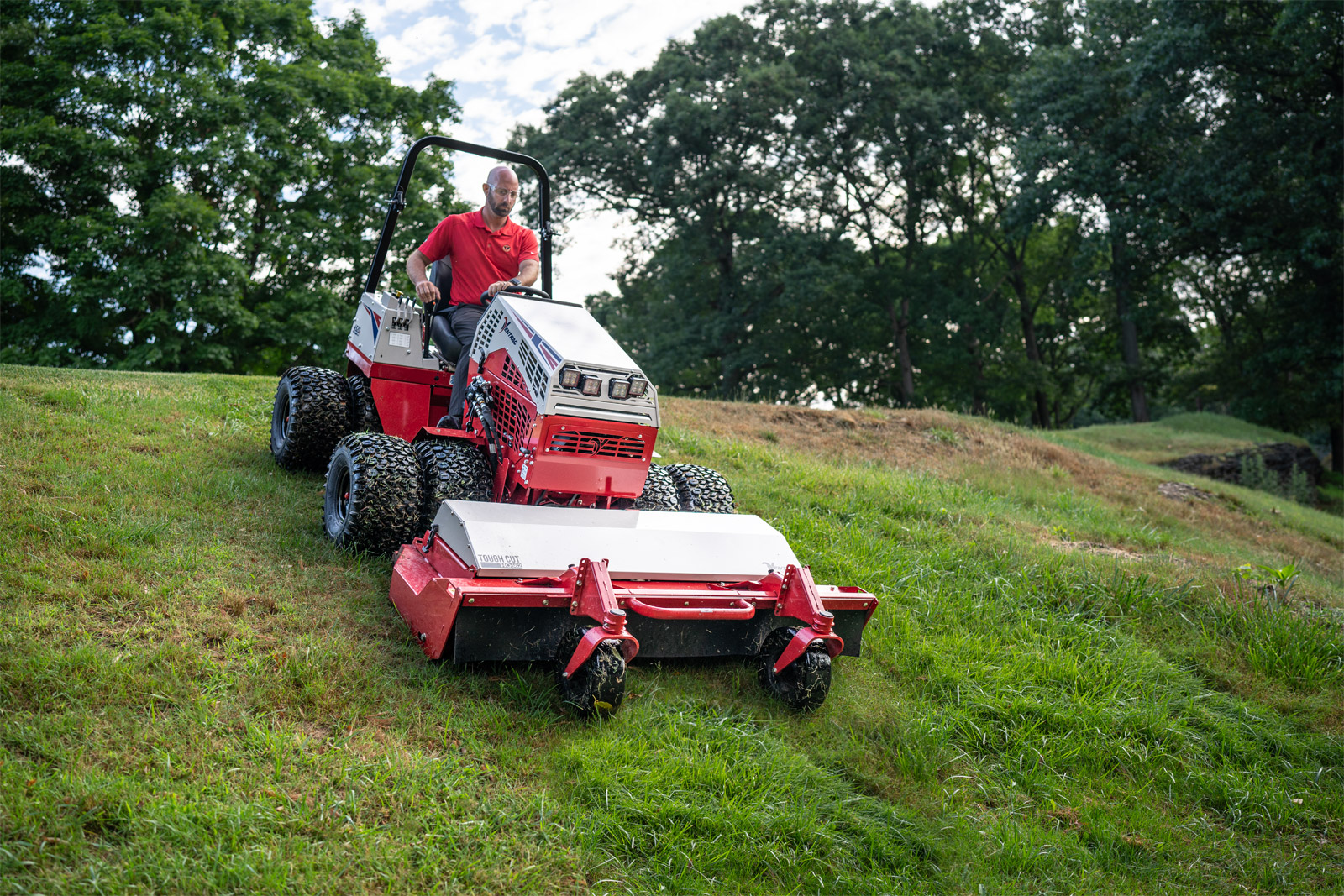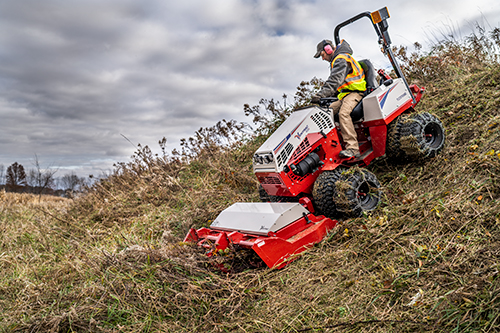The best tires for mowing on slopes are turf tires and all-terrain tires. These options provide excellent traction and stability on uneven ground.
Mowing on slopes presents unique challenges that require specialized equipment. The right tires play a crucial role in ensuring safety and efficiency during the task. Turf tires are designed with a tread pattern that minimizes soil compaction while offering good grip on grassy surfaces.
All-terrain tires, on the other hand, provide versatility for varied terrains, ensuring better control on inclines. Choosing the right tires can prevent slipping and enhance maneuverability, making your mowing experience smoother. Investing in quality tires tailored for slope mowing not only improves performance but also extends the life of your equipment. Prioritizing the right tire type leads to a more effective mowing routine.

Credit: www.ventrac.com
The Challenge Of Mowing On Slopes
Mowing on slopes can be dangerous. Proper traction is essential for safety. Without it, mowers can slip and cause accidents. The right tires help prevent these issues.
Choose tread patterns that grip the ground well. Aggressive treads offer better traction on steep areas. Tires with wider profiles can also help maintain balance.
Look for tire materials that resist wear. Durable tires will last longer and perform better. Air pressure in tires is also important. Proper inflation increases stability and control.
Consider using turf tires designed for slopes. They provide a softer ride and better grip. This choice helps reduce the risk of tipping over.
Types Of Tires For Sloped Mowing
Standard turf tires are great for mowing on slopes. They provide excellent traction and stability. These tires have a wide surface area. This helps prevent slipping on wet grass.
All-terrain tires are versatile and can handle various surfaces. They perform well on both grass and dirt. Their tread design enhances grip on uneven ground. This makes them suitable for sloped areas.
Ribbed tires have a unique pattern that aids in steering. They offer good maneuverability on hills. These tires are often lighter than others, which reduces strain on the mower. This can be beneficial for steep slopes.
Tire Tread Patterns And Slope Mowing
Choosing the right tire tread pattern is essential for mowing on slopes. Tread design affects traction and stability. Look for deep grooves and wide channels. These features help grip the ground better.
Different tread types serve various needs. Turf tires are ideal for gentle slopes. Their design minimizes damage to grass. Agricultural tires work well for steeper areas. They provide excellent grip and stability.
Directional treads are another option. They enhance traction during forward movement. This design helps in maintaining control while mowing. Cross-pattern treads also offer balance. They prevent slipping on uneven ground.
| Tread Type | Best For |
|---|---|
| Turf Tires | Gentle Slopes |
| Agricultural Tires | Steep Slopes |
| Directional Treads | Forward Movement |
| Cross-Pattern Treads | Uneven Ground |

Credit: m.youtube.com
Tire Materials And Durability
The best tire materials for mowing on slopes are important for safety. Rubber compounds play a key role in performance. They provide grip and stability on uneven ground.
High-quality rubber offers better puncture resistance. This means less chance of flat tires while mowing. Tires with reinforced sidewalls help reduce damage from sharp objects.
Choosing the right tire can improve mowing efficiency. Look for tires designed specifically for hilly terrains. These tires help maintain control and prevent slipping.
Inflation And Tire Pressure On Slopes
Proper tire inflation is crucial for mowing on slopes. Under-inflated tires can lead to poor traction. This may cause slips and falls. Over-inflated tires can make the ride bumpy. They can also reduce grip on uneven surfaces.
Adjusting tire pressure helps improve stability. Lower pressure often increases the tire’s contact with the ground. This provides better control on steep areas. Higher pressure can be good on flat surfaces but not on slopes.
| Inflation Level | Effects |
|---|---|
| Under-Inflated | Poor traction, slips, and falls |
| Over-Inflated | Bumpy ride, reduced grip |
| Optimal Pressure | Better control, improved stability |

Credit: www.ventrac.com
Tire Size And Weight Distribution
Choosing the right tires is essential for mowing on slopes. Wider tires provide better balance on uneven ground. They reduce the risk of tipping over. A wider surface area gives more grip and stability.
Weight distribution plays a crucial role in mower performance. Proper weight distribution helps maintain control on slopes. Tires with a larger footprint help distribute weight evenly. This reduces the chances of sinking into soft ground.
Optimizing tire weight is also important. Lightweight tires improve maneuverability and speed. Heavier tires can offer more traction but may hinder performance. Finding the right balance ensures effective mowing.
Enhancements For Mowing On Slopes
Choosing the right tires for mowing on slopes is essential. Wheel weights can significantly improve stability. They help maintain traction on steep areas. Adding weight lowers the center of gravity. This prevents the mower from tipping over.
Using tire chains is another great option. Chains provide extra traction on slippery surfaces. They grip the ground better than regular tires. This helps prevent sliding or losing control. Consider the terrain when choosing tires or chains.
Maintenance Tips For Slope Mowing Tires
Regular inspection routines for slope mowing tires are very important. Check tire pressure often. Proper pressure ensures better traction and stability on slopes. Look for signs of wear and tear. Replace tires if they show cracks or bulges.
Keep tires clean from mud and debris. This helps maintain their grip. Rotate tires regularly to ensure even wear. This practice extends tire life and improves performance.
| Maintenance Task | Frequency |
|---|---|
| Check Tire Pressure | Every Week |
| Inspect for Damage | Every Month |
| Clean Tires | After Each Use |
| Rotate Tires | Every 50 Hours |
Tire replacement is key for safety. Old tires can slip on slopes. Choose tires designed for hilly terrains. They offer better grip and stability.
Selecting The Right Tires For Your Mower
Choosing the right tires for mowing on slopes is very important. Assess your mower’s compatibility with different tire types. Tires should fit your mower’s size and weight properly.
Consulting with tire professionals can provide valuable insights. They help you understand which tires work best for your specific mower. Experts can recommend tires that offer better traction and stability on slopes.
Look for tires with a deep tread pattern. This design helps grip the ground better. Wide tires can also help distribute weight, reducing the risk of tipping over.
Always prioritize safety and performance when selecting tires. Proper tires can enhance your mowing experience significantly.
Frequently Asked Questions
What Are The Best Tire Types For Mowing Slopes?
The best tire types for mowing slopes are turf tires and ag tires. Turf tires have a wider tread for better traction without damaging the grass. Ag tires provide excellent grip and stability, especially on uneven surfaces. Both options enhance performance and safety when mowing on inclines.
How Do Tire Treads Affect Slope Mowing?
Tire treads significantly impact slope mowing by influencing traction and stability. Deeper treads provide better grip on uneven terrain. A wider tread helps distribute weight and reduces soil compaction. Choosing the right tread pattern is crucial for safe and efficient mowing on slopes.
Can I Use Standard Tires For Mowing On Slopes?
Using standard tires for mowing on slopes is not recommended. Standard tires may lack adequate traction and stability on inclines. This can lead to potential accidents or damage to your lawn. Opting for specialized tires ensures safer and more effective mowing in hilly areas.
How Does Tire Pressure Affect Slope Mowing Performance?
Tire pressure plays a vital role in slope mowing performance. Properly inflated tires offer better traction and stability. Over-inflated tires can reduce grip, while under-inflated tires may increase the risk of tipping. Regularly checking tire pressure is essential for optimal mowing on slopes.
Conclusion
Choosing the right tires for mowing on slopes is crucial for safety and efficiency. Opt for tires with deep treads for better traction. Consider wider tires to distribute weight evenly. Ultimately, the right tires will enhance your mowing experience and keep your equipment performing at its best on challenging terrains.
